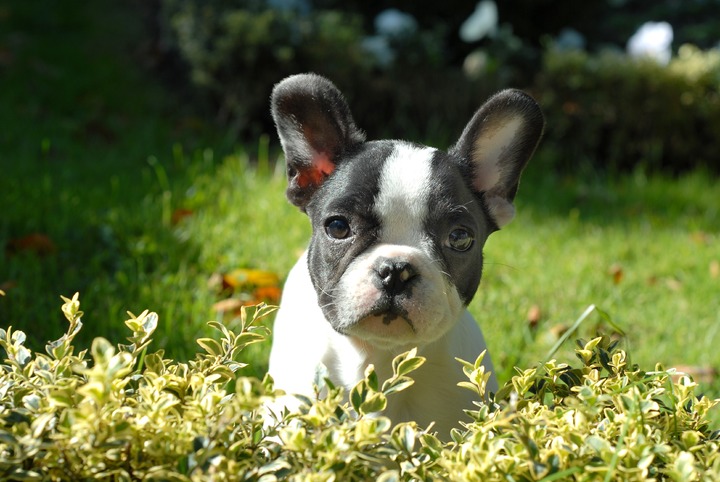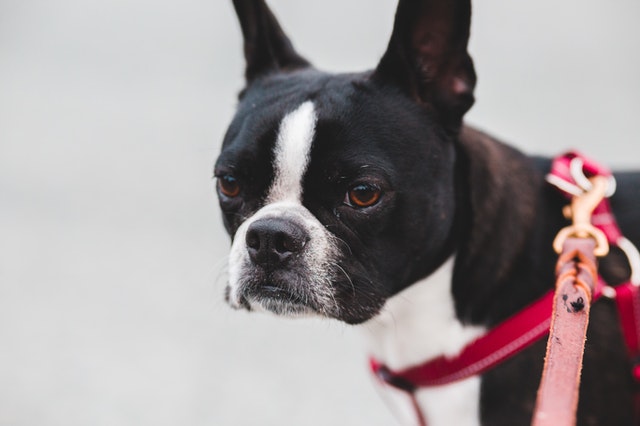Nicknamed as the ‘American Gentleman’, Boston Terriers are easy to spot with their tuxedo-like coat. However, Boston Terrier skin allergies can ruin this distinct look. This is why dog owners should be aware of the signs and how they should deal with this condition.
As pet owners, it’s our responsibility to keep our dogs in good shape. This includes keeping allergies at bay, together with other health problems.
In this post, we’ll take a look at dog allergies, what causes them, and what you can do to maintain a hypoallergenic environment at home.
Is Boston Terrier skin allergies common?
While all dog breeds can develop an allergy at some point, Boston Terriers tend to be more prone to skin allergies.
Canine skin allergies can be due to a lot of things. One dog may react to a trigger while others won’t. Also, other health conditions can lead to skin allergies.
To give you an idea, the following are the most common causes:
1. Food allergy

One of the most common causes of Boston Terrier skin allergies is a food allergy. When your dog eats a trigger food, it then causes a slew of symptoms. One of which is skin irritation as a secondary condition.
Dogs suffering from food-induced skin allergy will have skin rashes all over its coat. This will be accompanied by vomiting, diarrhea, and lethargy.
Take note that canine allergies aren’t only due to grains. While some dogs tend to be very sensitive with the likes of corn and soy, it’s not always the case. In fact, many cases of food allergy are rooted in the protein source of the dog’s food.
Your Boston Terrier can develop an allergic reaction to just about any food item. It could be beef, chicken, or tuna. It varies widely per canine, so it’s best to consult the vet for a proper diagnosis.
Moreover, your dog won’t build up tolerance by repeatedly feeding the trigger food. The allergic reaction will only get worse. From mere skin allergy, your dog may land in the emergency room of a pet hospital.
2. Contact allergy

Contact or environmental allergy is also a common occurrence among Boston Terriers. This breed has a short coat, so irritants can easily get into the skin.
The most common contact allergy triggers are pollen and dust. Still, something as mundane as grass and leaves can lead to skin allergies among dogs.
Aside from environmental factors, direct contact with human shampoo, soap, and cleaning agents can trigger severe skin irritations. Boston Terriers with overly sensitive skin can also develop skin allergies when they rub on metals.
Inside the house, carpets are a known culprit. If not vacuumed regularly, carpets can harbor nasty allergens that will get into your dog’s skin once it lies down.
3. Yeast dermatitis

Boston Terriers can also suffer from a condition called Malassezia or yeast dermatitis. This occurs due to the overgrowth of the Malassezia pachydermatis fungus.
The sudden increase in the Malassezia fungus population will cause inflammation of the skin. It’s also accompanied by the following symptoms:
Symptoms of yeast dermatitis
- Flaky and crusty skin
- Musty odor
- Redness and severe itching
- Hyperpigmentation
The good thing here is that yeast dermatitis isn’t contagious. If one of your Boston Terriers got it, the pooch wouldn’t infect other canines.
However, you should know that ear infections accompany many cases of yeast dermatitis. It’s best to seek veterinary care for proper treatment.
At the vet’s clinic, your dog will undergo skin scraping to collect yeast organisms. The veterinarian will examine this sample to confirm the presence of the fungus.
Other techniques to diagnose yeast dermatitis include skin biopsy, cotton swab sample, and impression smear.
Once diagnosed, your Boston Terrier will be prescribed a topical regimen. It usually includes medicated shampoo and oral antibiotics.
4. Bacterial hypersensitivity

Canines can also suffer from bacterial hypersensitivity. Your Boston Terrier’s immune system probably overreacts to the Staphylococcus bacteria normally present on the skin. Take note that bacterial hypersensitivity occurs even if the bacteria level is within the normal range.
To diagnose this problem, the vet will conduct bacterial culture as well as a biopsy sample. If your Boston Terrier is diagnosed with bacterial hypersensitivity, the main focus will be to stop its itching.
Medicated shampoo, topical ointments, and sprays will provide immediate relief to your pet. Just make sure that the veterinarian duly prescribes it.
Even after your dog’s bacterial hypersensitivity has been treated, it can recur. It’s important to keep in touch with your dog’s vet for proper guidance.
5. Flea allergy dermatitis

Boston Terriers suffering from flea allergy dermatitis (FAD) is hypersensitive to a substance found on the flea’s saliva. Dogs suffering from this condition can suffer from severe itching with just one flea bite.
Most cases of FAD in dogs are observed to appear within the age of 2 to 5. Still, older dogs aren’t invincible to this skin problem.
Severe itching and hair loss on the affected area are just some of the tell-tale signs of flea allergy dermatitis.
To diagnose whether your Boston Terrier has FAD, the vet will conduct specialized blood tests. Nevertheless, the onset of flea allergy dermatitis is very easy to treat, and in-depth tests aren’t always required.
The key to preventing flea allergy dermatitis is keeping your dog protected against the parasite. You should give your dog a monthly flea preventive regardless if it has a history of flea allergy dermatitis or not.
What to do if your dog has skin allergies
Consulting the vet is still the best move if you suspect that your dog has skin allergies. After proper diagnosis, your Boston Terrier would be prescribed any or a combination of these treatments:
- Medication baths. Unlike regular baths, you’ll have to use medicated shampoo on your dog. These shampoo products have active ingredients that will help neutralize the infection or skin itching. It’s also formulated with antifungal and antibacterial ingredients to help ease your dog’s skin flares.
- Topical medication. Topical medications are often given in line with medicated baths. This is to soothe and moisturize the irritated skin. Make sure that you’re using a topical solution that the vet recommended.
- Antihistamines. Many pet owners report high success rates in using antihistamines for their dogs. Benadryl, for one, is very effective on my Boston Terrier. However, you should consult the vet about the proper dosage. Aside from Benadryl, the vet may prescribe the likes of Atarax, Chlortrimeton, Clemastine, or Claritin.
- Antibiotics. In severe cases of skin allergies, your Boston Terrier will be given antibiotics to control the condition. Just remember that you should never self-administer antibiotics. This unsafe practice is dangerous and can lead to antibiotic resistance on the part of your dog.
How to prevent skin allergies on Boston Terriers
To prevent skin allergies in your dog, it’s important to maintain a hypoallergenic environment and lifestyle. The following are some of the helpful tips you can use:
- Buy high-quality food. Cheap dog food products are often to blame for the rise of food allergy among canines. It’s best to serve your dog with food that’s packed with whole protein and natural ingredients. Avoid artificial preservatives and coloring since these are potential irritants.
- Keep your home clean. Allergens will accumulate in your home if you don’t clean regularly. This won’t just trigger skin allergies on your Boston Terrier, but it will also wreak havoc on your respiratory system.
- Reduce outdoor activities. If your dog always gets skin irritations when going outdoors, it’s best to limit such activities. And if you are to bring your Boston Terrier outdoors, keep it leashed and pay close attention to what it touches or sniffs.
- Visit the vet regularly. Vet visits aren’t just for emergencies. You should schedule routine checks for your dog, so the vet can diagnose health issues before they trigger skin allergies.
- Keep your cleaning products locked. Boston Terriers are curious dogs, so ensure that your cleaning products are stashed away from their reach. If you’ve recently cleaned or treated an area, it’s best to keep your dog away until the products fully aerate.
Frequently Asked Questions
Q: Can I give my Boston Terrier Benadryl?
A: Benadryl is safe and effective in helping Boston Terriers suffering from an allergic reaction. However, you should only administer it to your dog after consulting the vet. This way, you’ll be advised about the safe dose and if your dog might suffer from adverse reactions.
Q: Can dogs outgrow their allergies?
A: Many cases of allergies among dogs won’t go away. However, some pet owners report that their dogs are no longer reacting as badly as they used on their triggers. It can be due to a change in diet and medications given by the vet. Just remember that your dog won’t build up immunity to the allergy trigger by exposing them to it. Doing so will only make things worse.
Q: Can CBD oil help with dog skin allergies?
A: While I haven’t tried this yet, many pet owners report positive results when using CBD oil for their dog’s allergies. You can mix it with the dog’s food or water. Aside from allergy relief, CBD oil can also help calm a nervous canine.
Q: Can I put Vaseline on my dog?
A: The general rule is that you should never use a human product for your dog unless the vet approves so. Using Vaseline in an effort to alleviate your dog’s itchy skin may do more harm than help. It’s best to seek the vet’s prescription for the right medication.
Q: Why is my dog so itchy but has no fleas?
A: If your dog is scratching incessantly despite being flea-free, you should get skin allergies checked. A Boston Terrier may develop skin allergies at any age, so you should be on the lookout for the symptoms. Aside from allergies, skin disease and compulsive behavior can also lead to endless scratching.
Final words
Boston Terrier skin allergies are one of the most common dilemmas of pet owners. Still, it can be treated and prevented with a proper diagnosis. Also, you should be diligent when it comes to cleaning your home to reduce your dog’s exposure to various allergens.
Does your Boston Terrier have skin allergies? How do you manage it? Share your tips below!

